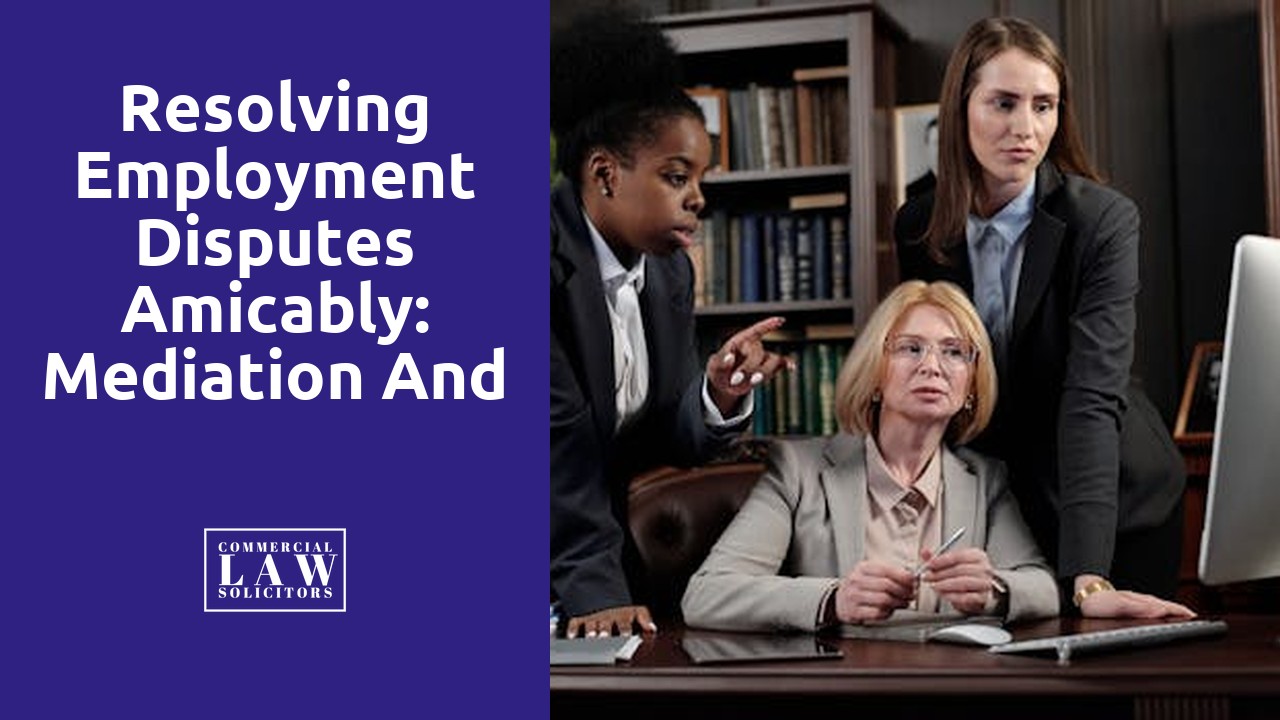Resolving Employment Disputes Amicably: Mediation and Arbitration

Finding Common Ground: Alternative Methods for Employment Conflict Resolution
Companies and organizations are increasingly recognizing the value of alternative methods for resolving employment conflicts. Instead of resorting to traditional adversarial approaches, these alternative methods emphasize finding common ground and promoting mutual understanding. By utilizing these approaches, employers and employees can work together to find solutions that benefit all parties involved.
One such alternative method is mediation, which involves the intervention of a neutral third party to facilitate productive dialogue between the conflicting parties. Mediation allows for open communication and encourages active listening, enabling the participants to express their concerns and needs in a non-confrontational environment. This approach empowers individuals to collaborate in finding mutually agreeable solutions, rather than relying on a judge or arbitrator to make a final decision. By fostering a sense of cooperation and shared responsibility, mediation can help rebuild trust, improve relationships, and promote a more positive and harmonious work environment.
Navigating Workplace Disagreements: A Path to Mutual Understanding
Navigating workplace disagreements can be a challenging task, but it is crucial for fostering a harmonious and productive work environment. In order to find a path to mutual understanding, it is essential to approach these disagreements with a tone of respect and open-mindedness. By maintaining a respectful tone, individuals can create a safe space for dialogue where differing perspectives can be shared and understood.
Another important aspect of navigating workplace disagreements is effective communication. It is essential to actively listen to others' viewpoints, seeking to understand rather than dismiss their ideas. By engaging in active listening, individuals can develop empathy and gain insights into the underlying concerns and motivations of their colleagues. This can open the door to finding common ground and working towards a mutually beneficial solution. Communication should be clear, concise, and free of judgment in order to foster an environment of trust and collaboration.
Building Bridges: Exploring NonAdversarial Approaches to Employment Disputes
Non-adversarial approaches to employment disputes are becoming increasingly popular in today's workplace. By shifting the focus from confrontation to collaboration, these methods aim to build bridges and find mutually beneficial solutions. This approach recognizes that conflicts in the workplace are inevitable, but it also acknowledges that traditional adversarial methods, such as litigation, can often escalate tensions and lead to further discord.
One of the key components of non-adversarial approaches is the emphasis on open communication and active listening. Instead of viewing disagreements as a battle to be won, these methods encourage all parties involved to engage in constructive dialogue and seek common ground. This fosters a sense of understanding and allows for the exploration of creative solutions that may not have been considered in a more adversarial setting. Ultimately, by building bridges and exploring non-adversarial approaches, employers and employees can work together to resolve conflicts more effectively and create a more harmonious work environment.
The Power of Mediation: Facilitating Productive Dialogue in Conflict Resolution
Mediation is a powerful tool for resolving conflicts in the workplace. It goes beyond the traditional adversarial approach by facilitating productive dialogue between the parties involved. Unlike litigation, which tends to pit one side against the other, mediation encourages collaboration and understanding.
One of the key benefits of mediation is that it allows for open and honest communication. The mediator acts as a neutral third party, creating a safe and confidential space for both parties to express their concerns and perspectives. This open dialogue enables the parties to better understand each other's viewpoints and work towards finding common ground. By actively listening and acknowledging each other's needs, the chances of reaching a mutually beneficial resolution are significantly increased.
Beyond Litigation: Exploring Mediation and Arbitration as Effective Alternatives
In today's fast-paced and ever-evolving business landscape, the traditional approach of litigation for resolving employment disputes is proving to be less effective and more time-consuming. As a result, there is a growing interest in exploring alternative methods such as mediation and arbitration. These approaches offer a more collaborative and less adversarial way of resolving conflicts, allowing parties to maintain a better working relationship and potentially reach mutually beneficial solutions.
One of the key advantages of mediation and arbitration is the element of neutrality and impartiality that is inherent in these processes. Unlike litigation, where a judge or jury makes the final decision, in mediation and arbitration, the parties have more control over the outcome. They are actively involved in the negotiation and discussion, allowing for a greater sense of ownership and satisfaction with the resolution. Additionally, the confidential nature of mediation and arbitration creates a safe environment for parties to openly express their concerns and points of view, facilitating a more productive and constructive dialogue.
Unlocking Solutions: Embracing Collaborative Approaches to Employment Disputes
Collaborative approaches to employment disputes are becoming increasingly popular as organizations recognize the value of resolving conflicts in a non-adversarial manner. By fostering a cooperative and constructive environment, these approaches aim to unlock solutions that benefit all parties involved. Rather than resorting to litigation or other adversarial methods, collaborative approaches prioritize open communication, active listening, and mutual understanding.
One such approach is mediation, where a neutral third party facilitates a productive dialogue between conflicting parties. Mediation allows individuals to express their concerns and interests in a safe and controlled setting, encouraging a more thorough exploration of potential solutions. The mediator helps the parties identify common ground and develop mutually agreeable resolutions, empowering them to take ownership of the outcomes. This collaborative process not only enhances the likelihood of resolving the conflict but also promotes improved relationships and ongoing cooperation within the workplace.
Related Links
Litigating Employment Disputes: The Court ProcessTypes of Employment Disputes and Legal Remedies
Expert Witnesses in Employment Disputes: Their Role and Importance
Proving Wrongful Termination in an Employment Dispute
Preparing for an Employment Dispute: Essential Documentation
Common Issues Arising in Employment Disputes